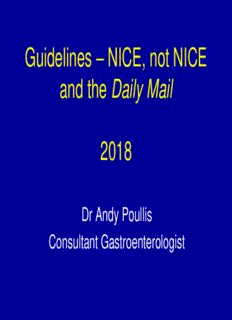
IBS Guidelines 2018 by Dr Andy Poullis PDF
Preview IBS Guidelines 2018 by Dr Andy Poullis
Guidelines – NICE, not NICE and the Daily Mail 2018 Dr Andy Poullis Consultant Gastroenterologist • Coeliac • IBS • Gall bladder polyps • PEI • PPI Who to test for Coeliac • persistent unexplained abdominal or gastrointestinal symptoms • faltering growth • prolonged fatigue • unexpected weight loss • severe or persistent mouth ulcers • unexplained iron, vitamin B12 or folate deficiency • type 1 diabetes, at diagnosis • autoimmune thyroid disease, at diagnosis • irritable bowel syndrome (in adults) • first-degree relatives of people with coeliac disease Consider testing • Metabolic bone disorder (reduced bone mineral density or osteomalacia) • Unexplained neurological symptoms (particularly peripheral neuropathy or ataxia) • Unexplained subfertility or recurrent miscarriage Genetic testing “Only consider using HLA DQ2/DQ8 testing in the diagnosis of coeliac disease in specialist settings (for example, in children who are not having a biopsy, or in people who already have limited gluten ingestion and choose not to have a gluten challenge).” HLA DQ2 / DQ8 • 90% of CD carry HLA DQ2 • Remainder carry DQ8 • DQ2 or DQ8 neg CD 0.4% • But 20% of healthy population carry DQ2 or DQ8 In addition to GFD… • Vaccinations NICE – no Coeliac UK – yes -Pneumococcal at diagnosis and 5 yearly booster -Flu annual vaccination should be considered -Anyone born between 1995 and 2014 to consider having the Meningococcal A,C,W,Y vaccination IBS subtypes IBS with constipation: >25% hard stools, <25% loose stools IBS-mixed: both hard and loose stools IBS with diarrhoea: >25% loose stools, <25% hard stools
Description: